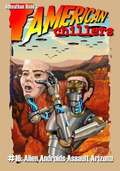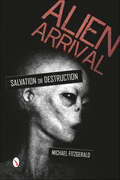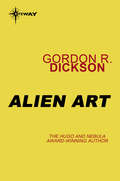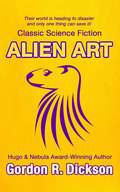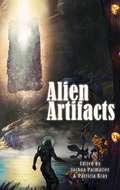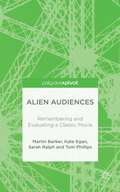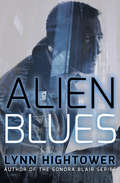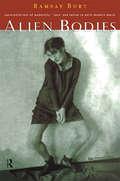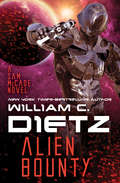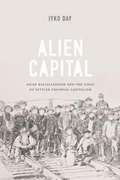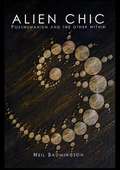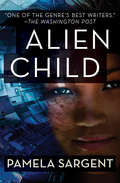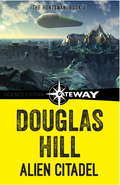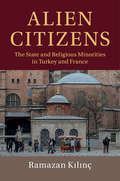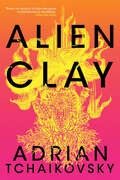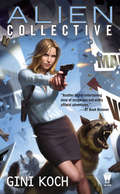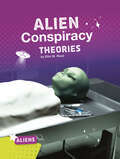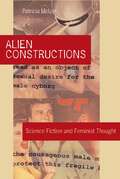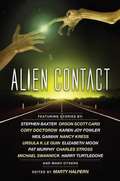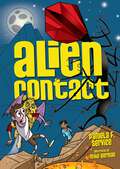- Table View
- List View
Alien Arrival: Salvation or Destruction
by Michael FitzgeraldAliens are among us already and their activities have increased enormously with the arrival of the new millennium. Journey with the author as he examines human/extraterrestrial interaction from ancient times to the present. Sightings, contact, and abduction cases are all considered, as well as a detailed study of the evidence for life on other planets, especially on Mars and the Moon. Become part of the search for extraterrestrial life and attempts to communicate with it. Explore the coverups and conspiracies, doomsday scenarios, and the possibility that the increase in UFO activity represents an attempt by extraterrestrials to encourage us to change direction and work together for the salvation of our planet. Or...is there a much more sinister plan afoot? Prediction: By the year 2030, we will have definite proof of the existence of intelligent life on other planets. Mysteries beckon.
Alien Art
by Gordon R DicksonOn the planet Arcadia, a young man and woman and a swamp otter join together to haul the otter's eleven hundred pound statue overland to meet the deadline of a prospective buyer from another planet.
Alien Art
by Gordon R. DicksonThe machine that controlled all life wouldn't tolerate any interference. People who refused to be regulated had to be disposed of - isolated, driven insane, murdered. A small group of men had dedicated themselves to fighting this Frankenstein of man's technological achievement. Secretly they laid plans to destroy the machine and all its worksincluding the millions of people who had accepted their robot-like existence. Either way, the human race was doomed!
Alien Artifacts
by C. S. Friedman David Farland Sharon Lee Steve Miller Walter H. Hunt Patricia Bray Joshua Palmatier Gail Z. Martin James Van Pelt Gini Koch Jacey Bedford Daniel J. Davis Coral Moore Sofie Bird Jennifer Dunne S. C. Butler Andrija Popovic Julie Novakova Larry N. Martin Angela Penrose Anthony Lowe Seanan McGuire Juliet E. McKennaWhat might we run into as we expand beyond Earth and into the stars? As we explore our own solar system and beyond, it seems inevitable that we’ll run into aliens … and what they’ve left behind. Alien artifacts: what might they reveal about us as we try to unlock their secrets? What might they reveal about the universe? In this anthology, nineteen of today’s leading science fiction and fantasy authors explore how discovering long lost relics of alien civilizations might change humanity. Join Walter H. Hunt, Julie Novakova, David Farland, Angela Penrose, S.C. Butler, Gail Z. Martin & Larry N. Martin, Juliet E. McKenna, Sharon Lee & Steve Miller, Andrija Popovic, Jacey Bedford, Sofie Bird, James Van Pelt, Gini Koch, Anthony Lowe, Jennifer Dunne, Coral Moore, Daniel J. Davis, C.S. Friedman, and Seanan McGuire as they discover the stars and the secrets they may hold—both dark and deadly and awe-inspiring.
Alien Audiences: Remembering And Evaluating A Classic Movie
by Kate Egan Martin Barker Tom Phillips Sarah RalphReleased in 1979, Ridley Scott's Alien has come to be regarded as a classic film, and has been widely written about. But how have audiences engaged with it? This book presents the – sometimes very surprising – results of a major audience research project, exploring how people remember and continue to engage with the film.
Alien Blues (Elaki #1)
by Lynn HightowerA jaded homicide detective working a serial murder case is teamed up with a new partner--a law enforcer from an alien race Big-city life in the near future is full of violence and tension for Saigo City homicide detective David Silver. His latest assignment is to track down a serial killer dubbed "Machete Man" because he hacks his victims to pieces. But Silver and his partner Mel Burnett just caught a break: One of Machete Man's intended victims--an elderly woman who would've been number six--escapes. And the killer left some DNA behind. Too bad the bureaucrats in charge have brought in a third wheel to assist the Homicide Task Force. Hailing from a superior race gifted with advanced technology, the Elaki have come to Earth to advise in everything from politics to medicine to big business--and now, it seems, police fieldwork. Standing seven feet tall with scales that ripple in the breeze, String resembles a stingray and smells like fresh lime. But he's turning out to be an unexpected asset in a case that's quickly morphing into something even more sinister: a far-reaching conspiracy that could leave a lot more people dead, including Detective Silver. A twisting, complex crime tale with intriguing characters, including Silver's DEA- turned-enforcer wife, Rose, and an Elaki named the Puzzle Solver, Alien Blues realistically depicts a world in which aliens and humans can coexist.
Alien Bodies: Representations of Modernity, 'Race' and Nation in Early Modern Dance
by Ramsay BurtAlien Bodies is a fascinating examination of dance in Germany, France, and the United States during the 1920s and 1930s. Ranging across ballet and modern dance, dance in the cinema and Revue, Ramsay Burt looks at the work of European, African American, and white American artists. Among the artists who feature are: * Josephine Baker * Jean Borlin * George Balanchine * Jean Cocteau * Valeska Gert * Katherine Dunham * Fernand Leger * Kurt Jooss * Doris Humphrey Concerned with how artists responded to the alienating experiences of modern life, Alien Bodies focuses on issues of: * national and 'racial' identity * the new spaces of modernity * fascists uses of mass spectacles * ritual and primitivism in modern dance * the 'New Woman' and the slender modern body
Alien Bounty (Sam McCade #3)
by William C. DietzFrom the New York Times–bestselling author of Legion of the Damned: &“When it comes to military science fiction . . . Dietz can run with the best&” (Steve Perry). A fragile peace between the Il Ronnian Empire and humankind is about to crumble--because space pirates have made off with one of the aliens' holiest relics. Only one man can hunt down the sacred object. A man with a score to settle with the pirates: bounty hunter supreme Sam McCade.
Alien Capital: Asian Racialization and the Logic of Settler Colonial Capitalism
by Iyko DayIn Alien Capital Iyko Day retheorizes the history and logic of settler colonialism by examining its intersection with capitalism and the racialization of Asian immigrants to Canada and the United States. Day explores how the historical alignment of Asian bodies and labor with capital's abstract and negative dimensions became one of settler colonialism's foundational and defining features. This alignment allowed white settlers to gloss over and expunge their complicity with capitalist exploitation from their collective memory. Day reveals this process through an analysis of a diverse body of Asian North American literature and visual culture, including depictions of Chinese railroad labor in the 1880s, filmic and literary responses to Japanese internment in the 1940s, and more recent examinations of the relations between free trade, national borders, and migrant labor. In highlighting these artists' reworking and exposing of the economic modalities of Asian racialized labor, Day pushes beyond existing approaches to settler colonialism as a Native/settler binary to formulate it as a dynamic triangulation of Native, settler, and alien populations and positionalities.
Alien Chic: Posthumanism and the Other Within
by Neil BadmingtonAlien Chic provides a cultural history of the alien since the 1950s, asking ourselves why our attitudes to aliens have shifted from fear to affection, and what this can tell us about how we now see ourselves and others. Neil Badmington explores our relationship with aliens, inscribed in films such as The War of the Worlds, Mars Attacks!, Mission to Mars and Independence Day; and how thinkers such as Descartes, Barthes, Freud, Lyotard and Derrida have conceptualised what it means to be human (and post-human). Alien Chic examines the the concept of posthumanism in an age when the lines between what is human and what is non-human are increasingly blurred by advances in science and technology, for example genetic cloning and engineering, and the development of AI and cyborgs. Questioning whether our current embracing of all things 'alien' - in the form of extraterrestrial gadgets or abduction narratives, for instance - stems from a desire to reaffirm ourselves as 'human', this is an original and thought-provoking contribution to the study of posthumanism.
Alien Child
by Pamela SargentA girl growing up in an insulated though pleasant environment, with a furry guardian for company, comes to realize that she must be the last human left on earth.
Alien Child
by Pamela SargentAlone on Earth, a young girl searches for a new beginning Nita is a child of the Institute. Ever since she can remember, she has roamed its sterile halls, living out her youth in the care of a fur-covered guardian from another world. The Institute's computers give her everything she could want--except another human to share her life with. Long ago there were people at the Institute, but something happened that wiped them out. As she matures, Nita slowly realizes that she may be the only human being left on Earth--and that the fate of humanity could well lie with her. Beyond a door marked Authorized Personnel Only is the "cold room," a laboratory that may hold the key to Nita's past--and her future. This is where her guardian found her, and it is to this place that Nita must return if she is to learn the secret of the Institute and what has happened to the rest of her kind.
Alien Citadel
by Douglas HillThe Wasteland people, fighting to save the Earth, are being driven into the fearsome radioactive Firesands by the relentless advance of the Slavers.As Finn, Baer and the other warriors gather for a last great struggle the arrival of an alien spaceship reveals a new threat, even more deadly than the robot-like aliens.Finn is captures and enslaved within the mighty walls of the alien Citadel, the Slavers' mountain fortress. Relying on nothing more than his uncanny wilderness instincts, he eventually escapes only to learn the devastating truth about the Slavers and their final plans for Earth and its people.
Alien Citadel
by Douglas HillThe Wasteland people, fighting to save the Earth, are being driven into the fearsome radioactive Firesands by the relentless advance of the Slavers. As Finn, Baer and the other warriors gather for a last great struggle the arrival of an alien spaceship reveals a new threat, even more deadly than the robot-like aliens. Finn is captures and enslaved within the mighty walls of the alien Citadel, the Slavers' mountain fortress. Relying on nothing more than his uncanny wilderness instincts, he eventually escapes only to learn the devastating truth about the Slavers and their final plans for Earth and its people.
Alien Citizens: The State and Religious Minorities in Turkey and France (Cambridge Studies in Social Theory, Religion and Politics)
by Ramazan KılınçHow does international context influence state policies toward religious minorities? Using parliamentary proceedings, court decisions, newspaper archives, and interviews, this book is the first systematic study that employs international context in the study of state policies toward religion, and that compares Turkey and France with regard to religious minorities. Comparing Christians in Turkey and Muslims in France, this book argues that policy change toward minorities becomes possible when strong domestic actors find a suitable international context that can help them execute their policy agendas. The Turkish Islamists used the European Union to transform the Turkish politics that brought a reformist moment for Christians in the 2000s. The Far Right in France utilized the rise of Islamophobia in Europe to adopt restrictive policies toward Muslims. Ramazan Kılınç argues that the presence of an international context that can favor particular groups over others, shifts the domestic balance of power, and makes some policies more likely to be implemented than others.
Alien Clay
by Adrian TchaikovskyFrom Arthur C. Clarke Award-winning author Adrian Tchaikovsky comes a far-future epic that confirms his place as a modern master of science fiction, in which a political prisoner must unlock the secrets of a strange and dangerous planet. The planet of Kiln is where the tyrannical Mandate keeps its prison colony, and for inmates, the journey there is always a one-way trip. One such prisoner is Professor Arton Daghdev, xeno-ecologist and political dissident. Soon after arrival, he discovers that Kiln has a secret. Humanity is not the first intelligent life to set foot there. In the midst of a ravenous, chaotic ecosystem are the ruins of a civilization, but who were the vanished builders and where did they go? If he can survive both the harsh rule of the camp commandant and the alien horrors of the world around him, then Arton has a chance at making a discovery that might just transform not only Kiln, but distant Earth as well.
Alien Collective (Alien Novels #9)
by Gini KochDespite not having run for office, nor wanting to remain in office, Representative Jeff Martini is being wooed as the vice presidential running mate for a charismatic senator who seems likely to win the campaign. While the Diplomatic Corps has to deal with the pressures of a political campaign sure to uncover secrets they don't want shared with the world, Ambassador Kitty Katt-Martini has other worries--handling the reemergence of her most potent nemesis, thought dead and buried.
Alien Conspiracy Theories (Aliens Ser.)
by Ellis M. ReedIs there life in outer space? Have aliens vistied Earth? Learn about the various conspiracy theories surrounding aliens.
Alien Constructions: Science Fiction and Feminist Thought
by Patricia MelzerThough set in other worlds populated by alien beings, science fiction is a site where humans can critique and re-imagine the paradigms that shape this world, from fundamentals such as the sex and gender of the body to global power relations among sexes, races, and nations. Feminist thinkers and writers are increasingly recognizing science fiction's potential to shatter patriarchal and heterosexual norms, while the creators of science fiction are bringing new depth and complexity to the genre by engaging with feminist theories and politics. This book maps the intersection of feminism and science fiction through close readings of science fiction literature by Octavia E. Butler, Richard Calder, and Melissa Scott and the movies The Matrix and the Alien series. Patricia Melzer analyzes how these authors and films represent debates and concepts in three areas of feminist thought: identity and difference, feminist critiques of science and technology, and the relationship among gender identity, body, and desire, including the new gender politics of queer desires, transgender, and intersexed bodies and identities. She demonstrates that key political elements shape these debates, including global capitalism and exploitative class relations within a growing international system; the impact of computer, industrial, and medical technologies on women's lives and reproductive rights; and posthuman embodiment as expressed through biotechnologies, the body/machine interface, and the commodification of desire. Melzer's investigation makes it clear that feminist writings and readings of science fiction are part of a feminist critique of existing power relations—and that the alien constructions (cyborgs, clones, androids, aliens, and hybrids) that populate postmodern science fiction are as potentially empowering as they are threatening.
Alien Constructions: Science Fiction and Feminist Thought
by Patricia MelzerThough set in other worlds populated by alien beings, science fiction is a site where humans can critique and re-imagine the paradigms that shape this world, from fundamentals such as the sex and gender of the body to global power relations among sexes, races, and nations. Feminist thinkers and writers are increasingly recognizing science fiction's potential to shatter patriarchal and heterosexual norms, while the creators of science fiction are bringing new depth and complexity to the genre by engaging with feminist theories and politics. This book maps the intersection of feminism and science fiction through close readings of science fiction literature by Octavia E. Butler, Richard Calder, and Melissa Scott and the movies The Matrix and the Alien series. Patricia Melzer analyzes how these authors and films represent debates and concepts in three areas of feminist thought: identity and difference, feminist critiques of science and technology, and the relationship among gender identity, body, and desire, including the new gender politics of queer desires, transgender, and intersexed bodies and identities. She demonstrates that key political elements shape these debates, including global capitalism and exploitative class relations within a growing international system; the impact of computer, industrial, and medical technologies on women's lives and reproductive rights; and posthuman embodiment as expressed through biotechnologies, the body/machine interface, and the commodification of desire. Melzer's investigation makes it clear that feminist writings and readings of science fiction are part of a feminist critique of existing power relations—and that the alien constructions (cyborgs, clones, androids, aliens, and hybrids) that populate postmodern science fiction are as potentially empowering as they are threatening.
Alien Contact
by Marty HalpernAre we alone? From War of the Worlds to Invasion of the Body Snatchers, ET to Close Encounters, creators of science fiction have always eagerly speculated on just how the story of alien contact would play out. Editor Marty Halpern has gathered together some of the best stories of the last 30 years, by today's most exciting genre writers, weaving a tapestry that covers a broad range of scenarios: from the insidious, to the violent, to the transcendent.
Alien Contact
by Marty HalpernAre we alone? From War of the Worlds to Invasion of the Body Snatchers, ET to Close Encounters, creators of science fiction have always eagerly speculated on just how the story of alien contact would play out. Editor Marty Halpern has gathered together some of the best stories of the last 30 years, by today's most exciting genre writers, weaving a tapestry that covers a broad range of scenarios: from the insidious, to the violent, to the transcendent.
Alien Contact (Alien Agent Ser. #5)
by Pamela F. ServiceZack will have to use all he's learned in his previous adventures to save Earth from the Gnairt. Fortunately, he's got some help this time. And she's kinda cute ...
